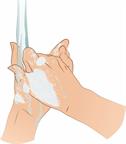Neutropenia
Neutropenia is a condition that occurs when you have low levels of neutrophils. Neutrophils are a type of white blood cells. They are made in the spongy center of bones (bone marrow). They fight infections.
Neutrophils are your body's main defense against infections. The fewer neutrophils you have and the longer your body remains without them, the greater your risk of getting a severe infection.
What are the causes?
This condition can occur if your body uses up or destroys neutrophils faster than your bone marrow can make them. Neutropenia may be caused by:
This condition can also occur if your bone marrow does not produce enough neutrophils. This problem may be caused by:
Cancer.
Cancer treatments, such as radiation or chemotherapy.
Viral infections.
Medicines, such as phenytoin.
Vitamin B12 deficiency.
Diseases of the bone marrow.
Environmental toxins, such as insecticides.
What are the signs or symptoms?
This condition does not usually cause symptoms. If symptoms are present, they are usually caused by an underlying infection. Symptoms of an infection may include:
Fever.
Chills.
Swollen glands.
Mouth ulcers.
Cough.
Rash or skin infection. Skin may be red, swollen, or painful.
Abdominal or rectal pain.
Frequent urination or pain or burning with urination.
Because neutropenia weakens the immune system, symptoms of infection may be reduced. It is important to be aware of any changes in your body and talk to your health care provider.
How is this diagnosed?
This condition is diagnosed based on your medical history and a physical exam. Tests will also be done, such as:
How is this treated?
Treatment depends on the underlying cause and severity of your condition. Mild neutropenia may not require treatment. Treatment may include medicines, such as:
Antibiotic medicine given through an IV.
Antiviral medicines.
Antifungal medicines.
A medicine to increase production of neutrophils (colony-stimulating factor). You may get this medicine through an IV or by injection.
Steroids given through an IV.
If an underlying condition is causing neutropenia, you may need treatment for that condition. If medicines or cancer treatments are causing neutropenia, your health care provider may have you stop the medicines or treatment.
Follow these instructions at home:
Medicines

-
Take over-the-counter and prescription medicines only as told by your health care provider.
-
Get an annual flu shot. Ask your health care provider whether you or anyone you live with needs any other vaccines.
Eating and drinking
-
Do not share food utensils.
-
Do not eat unpasteurized foods.
-
Do not eat raw or undercooked meat, eggs, or seafood.
-
Do not eat unwashed, raw fruits or vegetables.
Lifestyle
-
Avoid exposure to groups of people or children.
-
Avoid being around people who are sick.
-
Avoid being around live plants or fresh flowers.
-
Avoid being around dirt or dust, such as in construction areas or gardens. Wear gloves if you are going to do yard work or gardening.
-
Do not provide direct care for pets. Avoid animal droppings. Do not clean litter boxes and bird cages.
-
Do not have sex unless your health care provider has approved.
Hygiene

-
Bathe daily.
-
Clean the area between the genitals and the anus (perineal area) after you urinate or have a bowel movement. If you are female, wipe from front to back.
-
Get regular dental care and brush your teeth with a soft toothbrush before and after meals.
-
Do not use a regular razor. Use an electric razor to remove hair.
-
Wash your hands often with soap and water for at least 20 seconds. Make sure others who come in contact with you also wash their hands. If soap and water are not available, use hand sanitizer.
General instructions
-
Take steps to reduce your risk of injury or infection. Follow any precautions as told by your health care provider.
- Take actions to avoid cuts and burns. For example:
Be cautious when you use knives. Always cut away from yourself.
Keep knives in protective sheaths or guards when not in use.
Use oven mitts when you cook with a hot stove, oven, or grill.
Stand a safe distance away from open fires.
-
Do not use tampons, enemas, or rectal suppositories unless your health care provider has approved.
-
Keep all follow-up visits. This is important.
Contact a health care provider if:
-
You have a cough.
-
You have a sore throat.
-
You develop sores in your mouth or anus.
-
You have a warm, red, or tender area on your skin.
-
You have red streaks on the skin.
-
You develop a rash.
-
You have swollen lymph nodes.
-
You have frequent or painful urination.
-
You have vaginal discharge or itching.
-
You have a fever.
-
You have chills or shaking.
-
You have nausea or vomiting.
-
You have a lot of fatigue.
-
You have shortness of breath.
Summary
-
Neutropenia is a condition that occurs when you have a lower-than-normal level of a type of white blood cell (neutrophils) in your body.
-
This condition can occur if your body uses up or destroys neutrophils faster than your bone marrow can make them.
-
Treatment depends on the underlying cause and severity of your condition. Mild neutropenia may not require treatment.
-
Follow any precautions as told by your health care provider to reduce your risk for injury or infection.
This information is not intended to replace advice given to you by your health care provider. Make sure you discuss any questions you have with your health care provider.

